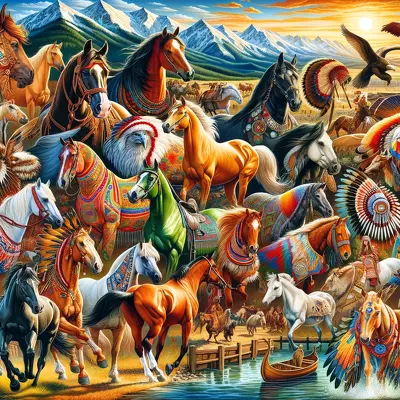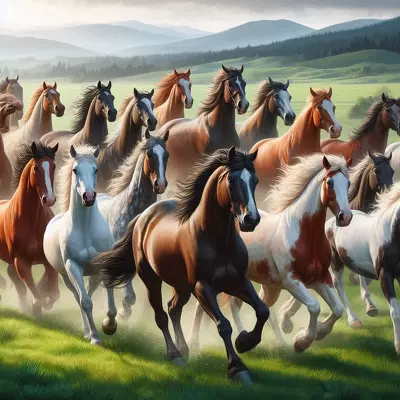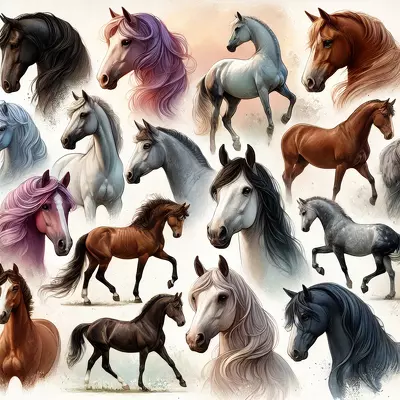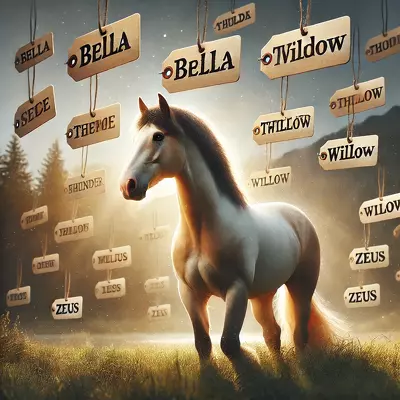Exploring Horse Naming Traditions Around the World: A Cultural Journey Through Equine Names
In many parts of the world, different cultures have unique styles and traditions when it comes to selecting names for horses that often resonate with local customs, beliefs, or history. Inspired by nature, mythology, or particular abilities—those traditions expose a complex relationship men create with horses and widely consider these species as more than animals but companions representing strength, beauty, and nobility.
In this post, we will cover all you need to know about how different countries name their horses. In addition, we will go over the meanings and possible origins of these beautiful names so you can further refine your choices to find one that perfectly suits your horse!
Native American Horse Names: Reflecting Nature’s Spirit
The names of horses are also inspired by nature, as the Native American tribes have a strong tie with their environment. Important to the ways of many tribes, horses assisted in hunting and combat—even though some tribes were already equipped—further preferring animals to carry their loads as they traveled between tribal communities. Therefore, their names are usually inspired by the beauty of natural elements or what that horse represents.
- Kiona – This name comes from the Native American language and means “brown hills”, so this could be suitable for a horse with that type of hair.
- Tala – Tala, which means wolf—a powerful and independent horse.
- Aponi – This means “butterfly” and is frequently used for lighter, more graceful horses.
Many Native American horses were given names, similar to the christening process in which a baby is named for how it fits into their society.
Arabic Horse Names: Nobility and Grace
Horses, particularly those of cherished Arabian bloodlines native to Arabic countries (developed in harsh desert conditions), enjoy a status like no other; they are revered and respected. Most traditional Arabic horse names are rooted in what they appreciate most in a horse: nobility, elegance, and power.
- Sahar – Arabic for “dawn,” so this name suits light or bright horses the best.
- Farid – For unique horses that rise up to the competition.
- Aziz – Given to stallions that are powerful or can mean “beloved,” evoking the esteem Arabs often felt for their livestock.
Arab horses have for centuries been a mirror of their owners, and usually the names they receive are reflected in their appearance as well as in their own character.
Celtic Horse Names: Mythology and Nature
In ancient Celtic culture, horses also represented power, fertility, and the otherworld. Celtic horse names often appeared in tales of fable, so many of the titles are derived from such myths, elements, or ancient gods and goddesses.
- Epona – Celtic horse goddess who was often invoked for protection. It seems such a divine name to give one’s horse.
- Bran – Meaning “raven,” a bird that symbolizes quickness, intelligence, and forethought. This name could work well for a smart or cunning horse.
- Rhiannon – Welsh goddess connected to horses, powerful and graceful. Suitable for a large mare.
Celtic horse names are full of tradition and mostly magical or mystical in nature, perfect for anyone looking to give their horse a name with mythological or spiritual roots.
Spanish Horse Names: Elegance and Passion
Spain’s famous stallion, the Andalusian horse, is considered to be one of the most elegant and feisty breed lines. It makes sense then that Spanish horse names tend to reflect such qualities, often invoking, in keeping with Spain’s robustly beautiful linguistic and cultural traditions.
- Luz – Is Spanish for “light,” a perfect fit if you have a bouncy horse.
- Valiente – Brave; a great name for a brave or bold horse.
- Esperanza – This name means “hope,” so if your horse has a resilient, optimistic character, this could be the perfect name for her.
Many Spanish horse names are poetic and powerful, which reflects the nation’s liveliness as a whole.
Japanese Horse Names: Nature and Honor
Here in Japan, horses are holy animals that were once considered gods. Japanese horse names often reflect strong beliefs in nature and traditional values. Names consist of elements present in nature, conveying authority, honor, and loyalty, as per these originating moral values.
- Yuki – This name means “snow,” so it is the perfect horse’s name for a white mare or one that was born in winter.
- Hana – Flower; it gives a sense of beauty and grace.
- Kenzo – In homage to the incredibly resilient horse, this name means “strong and healthy.”
Japanese horse names are beautiful yet universally poetic, thus a wonderful choice for anyone who loves that quiet elegance in naming their horses.
Mongolian Horse Names: Strength and Survival
Mongolia is called the land of the horse, and horses are a daily necessity in life, using them to travel, for example, on endless plains. These Mongol horses receive names according to their endurance and strength, sometimes even indicating that they are superheroes.
- Temujin — After a mighty historical figure, Genghis Khan. For an assertive horse, nothing does justice to power like a bold and regal name.
- Tsagaan – White, typically used for light-colored horses.
- Suhkbaatar – An axe hero and a suitable title for any sturdy horse.
Mongolian horse names often show a deep respect for the physical strength and stamina of the Mongol ponies, as in Mongolia horses are more than pets—they are indispensable to life.
Icelandic Horse Names: Elements and Geography
The diminutive frame and power of the Icelandic horse have become legendary. Many Icelandic horse names are tied to the unique geography of the country or natural elements.
- Hekla – This Icelandic volcano name would suit a feisty and independent horse.
- Skjóna – Piebald; a type of horse coat color.
- Vindur (Wind) — Great for a fast horse.
In Icelandic, there are a lot of words to capture the harsh, desolate beauty of its landscape or in relation to this unique breed on an island ruled by both fire and ice.
Tips for Choosing the Perfect Horse Name
- Consider Your Horse’s Appearance and Personality: Horses are unique, and names will be too. Look at your horse’s coat, size, and characteristics. Is your horse laid back and sweet or a spunky one? For example, a fast horse might be named “Blaze”; it’s hard to imagine a horse named “Dove” doing a Spanish walk.
- Think About the Sound: Since the horses will come to learn their name, it is best that you choose something easy for them and simple enough so they don’t confuse it with similar-sounding words. Good options are short names or longer ones with strong sounds like “Koda,” “Storm,” etc.
- Get Inspired by Their Heritage: If you own a horse of some ancient breed, name him after horses from their homeland. For, an Andalusian horse could accommodate a Spanish name, and an Arabian breed member might hold a name with Arabic roots.
- Be Creative and Personal: Having some fun and being creative with things goes a long way! It will help your horse to stand out from the crowd with a unique name. Think of memories, places you love, or things that mean something to you like books and movies.
Conclusion
Horse naming is, in many ways, an affectionate and conventional practice in many places around the world. Whether that tradition goes back in time to mythological or nature-based associations or is more grounded in your particular animal’s character and personality, naming a horse has always been intended to convey something of the bond between human and non-human animals. If you look at horse naming traditions from around the world, it could certainly help to inspire a name which not only represents who your horse is but also carries with it history and strength along its journey.





